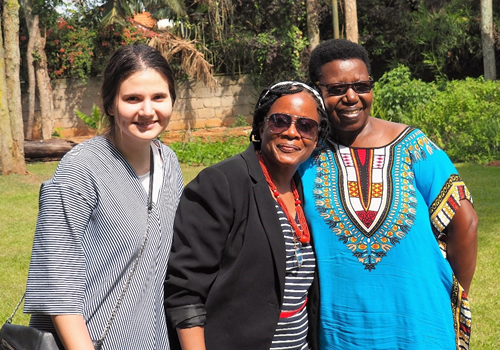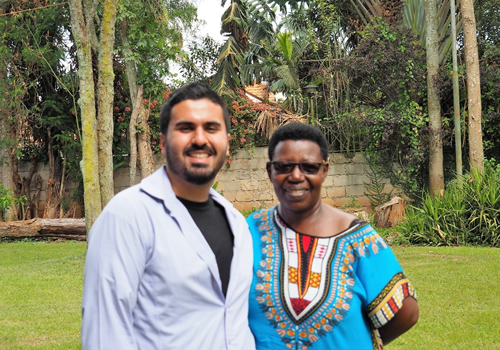Historians generally gain an understanding of the past from texts, or what Nakanyike Musisi calls “cold” sources that are frozen in time and unchanging. That’s why she created an opportunity for her students to experience a more dynamic version of history by travelling to Uganda to study the life of a powerful — and very much alive — African woman.
“I am introducing students to biography and the person behind it in a very intimate way,” said Musisi, an associate professor of history in the Faculty of Arts & Science.
During Reading Week, Musisi accompanied 12 students from her fourth-year seminar course, Elite Women, Power and Modernity in 20th Century Africa, to Uganda for an in-depth exploration of the life of Miria Matembe. Matembe grew up poor in rural Uganda, but education as a lawyer led her to government, where she served as a Member of Parliament for more than 20 years and as Uganda’s representative to the Pan-African Parliament.
An outspoken advocate for women’s rights, Matembe served as a member of the constitutional commission that drafted Uganda’s Constitution and was responsible for much of the language on gender. She is also the co-founder of Action for Development, a major women’s advocacy organization in Uganda. Now retired from government, Matembe lives in Kampala, where she met with Musisi and her students.
Unique opportunity to gather information from living sources

During their course, Musisi’s students had read a biography of Matembe in class, but the trip allowed them the unique opportunity to gather information about her from living sources: Matembe herself, as well as the people who worked with her in various capacities, such as government officials, young feminists and academics.
“I wanted them to collect information about her and assess her based on these sources, then compare their impressions to what they’d learned from reading about her,” Musisi said. “They were able to learn historical research techniques beyond traditional texts, using oral sources and different methods of getting information.” They were also able to learn the difference between interviewing with a set list of questions and dialoguing, an opportunity for an informal conversation that still has direction and purpose and can yield rich information.
After a 15-hour flight to Uganda, plus stopovers to change planes, the group arrived in Entebbe, a major town in Central Uganda about 37 kilometres southwest of the Ugandan capital of Kampala, where they spent a few days immersing themselves in Ugandan culture, history and language.
We began with breakfast and spent 10 to 12 hours a day together. It’s like having six weeks of class all at once in one day.
“It was all about learning,” Musisi said. “We began with breakfast and spent 10 to 12 hours a day together. It’s like having six weeks of class all at once in one day.”
With questions developed in advance as the framework for their conversation, the group visited Matembe at her home for an informal dialogue. Afterward, Musisi held a debriefing session so they could compare what they discovered in meeting Matembe with the impressions they had from reading about her, determine the gaps in their knowledge lay and refine their course of inquiry.
Meetings with academics, government officials and women’s rights advocates helped round out their knowledge. Before leaving Uganda, the students had a second visit with Matembe, allowing them to solidify or revise their impressions.
The best part of the trip was meeting people with multiple perspectives on similar issues.

“The best part of the trip was meeting people with multiple perspectives on similar issues, both contemporary and historical,” said Hesam Wafaei, a fourth-year student majoring in international relations. “We gained a rich and diverse understanding of the ways that high-level officials and activists think about the women’s movement in Uganda.”
Wafaei enjoyed comparing Miria Matembe, the historical figure, with the actual woman.
“I was pleasantly surprised to see that Miria Matembe the person was very similar to Miria Matembe the subject of autobiography,” he said. “The same confidence, boldness, and energy I read in the text were presented to me by the person. This impression of her personality did not change as I met others who know her or are working on similar issues.
“However, my understanding of her politics did change as I spoke to her and others. When speaking to others, we got the sense that Matembe’s activism is limited to the extent that it does not necessarily advocate for justice for all kinds of women. For example, she, like many other Ugandans, is reluctant to advocate for the rights of LGBTQ people.”
Activists, such as Matembe, are complicated politically. I realized that there are often pros and cons to any one person’s politics.
Nonetheless, Wafaei said, he realized that “activists, such as Matembe, are complicated politically. I realized that there are often pros and cons to any one person’s politics. The limits of her activism do not, in my opinion, invalidate the strengths of her activism.”
Nicole Nwokolo, a fourth-year student majoring in diaspora and transnational studies, said the trip opened her eyes to different ways of seeing the world.
“It was great to see a perspective that wasn’t Canadian and view the differences in social norms,” she said. “We had to push ourselves to be more open and aware.”
Nwokolo was surprised by the strong evidence of religion in the country, with preachers on street corners.
“With all the holidays we celebrate in Canada, I think of it as a Christian country, but religion has a huge importance in Uganda with evangelism that you don’t see here or in Nigeria, where I come from,” she said.
Nwokolo was also very surprised by the emphasis placed on family in Uganda, especially for women, and the status that marriage conferred.
“The women who are working to make changes in society first have to make sure their husbands and families are okay,” she said. “If a woman is an activist and her marriage is broken, she is seen as less than and is almost mocked. I doubt that single women would have the status to be taken seriously.”
Nwokolo was passionate about the educational value of the visit to Uganda.
“Experiencing things is so different from just reading about them,” Nwokolo said. “We wouldn’t have had the same understanding of Uganda, its politics and its activists, if we hadn’t gone there.”
The undergraduate trip to Uganda was supported by the International Course Module (ICM) program in the Faculty of Arts & Science. ICMs provide students with direct exposure to the international phenomena they are studying in their courses.

